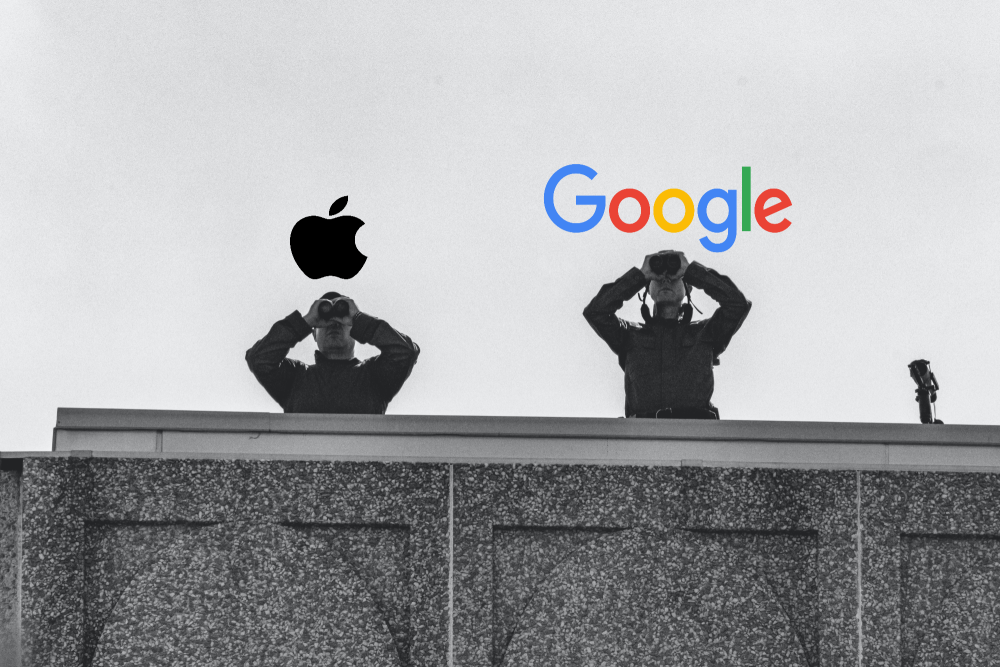Your own personalised stalker
It always seemed slightly creepy that your computer shows advertising that is strangely accurately targeted at things you might have been interested in. On the surface, that seems quite useful. If you have to tolerate ads on your screen, at least having them show things you were interested in seems helpful.
Instead, we wonder how the system knows. It feels like a breach of our privacy.
It all starts when you install an app, and it pops up a question asking for permission to use your location, and/or your camera and/or your microphone.
This is useful for advertisers. For example, they can use your location. If the app reports this back to the content provider, they can match up your location and compare you to other people nearby. If you tend to go to the same places as other people, you are probably interested in the same things, so an advertiser might use that assumption to present advertising to you, or other people that you spend time with.
That does sound a bit overreaching, but we reluctantly agree to the presented terms simply because we want to use the app. If that is a condition of use, and we want to use the app, then we agree.
So, now we are seeing consumers getting the choice to push back.

Apple
Now, with iOS15, Apple are saying that you will get to see what apps are accessing your data. You will be able to see when an app used that permission, and there it was sent to. Whether that list of third party sites is any use or not is meaningful is unclear.
Not quite as advanced but following quickly behind is Google Android. With Android 12, you will have the option to de-personalise your data. They will still track usage, but won’t link it back to you.
Is there any truth to the rumour that your phone or TV is listening to you, and presented content based on private conversations it overhears?
Given how poor the voice recognition is on phones , cars, or tools like Alexa or Siri, its pretty evident this can’t be reality. If it, is, then heaven only knows what it thinks it’s hearing. The voice recognition tools are getting better all the time, but there is a long way to go.
Webinar Replay: Decoding SMB1001. Understanding Your Cybersecurity Maturity
Cybersecurity certification doesn't have to be complex or overwhelming. Understanding SMB1001: What is SMB1001 and why it was created specifically for organisations like yours The five certification levels (Bronze to Diamond) and what each means for your organisation...
Beyond Endpoint Protection – What is ITDR?
Your Microsoft 365 environment is where your business happens. It's also where attackers want to be. Most New Zealand businesses have invested in endpoint protection such as antivirus, EDR, or even MDR, but are they leaving a critical attack surface completely...
Manage My Health Data Breach – What We’ve Heard
What New Zealand Businesses Need to Learn from 126,000 Compromised Patient Records New Zealand's largest patient information portal confirmed a major cyber security breach on New Year's Eve, with up to 126,000 users potentially affected. The Manage My Health incident...
URGENT ADVISORY: We’re seeing a significant increase in authentication attacks this Christmas
Significant Hacking Trend Over this 2025/26 Christmas and New Year period, our Kinetics KARE security monitoring has detected a significant increase in sophisticated authentication attacks targeting New Zealand businesses. KARE Foundation clients are protected and...
Your Customers Need to Trust Your Emails: Here’s How DMARC 2.0 Helps
Yet another IT acronym: "DMARC" DMARC stands for Domain-based Message Authentication, Reporting, and Conformance. It's an email authentication protocol that helps protect your domain from being used in email spoofing, phishing attacks, and other cyber...
Christmas is coming. But will you get a visit from Santa or from a grinchy hacker?
Protecting Yourself from Cyber Threats While on Holiday We're more vulnerable than normal to hackers at this time of year. Unfortunately, the hackers know it and tend to be more aggressive.In the rush up to Christmas, there's normally so much to do that we're all that...
Understanding Your Microsoft Secure Score: Why Your Percentage May Drop (While Your Security Improves)
Important Update for KARE Foundation Subscribers If you've noticed your Microsoft Secure Score percentage decreasing recently, don't be alarmed. Your security hasn't weakened. In fact, Microsoft is making significant enhancements that will ultimately make your...
2025 Q4: Cyber Landscape Update (are you still feeling lucky? New Zealand’s Cyber-threat landscape demands action)
Why This Brief Matters A cybercriminal only has to be lucky once. You have to be lucky every minute of every day. That remains the stark reality for kiwi businesses in Q4 2025. This isn't another dry technical report filled with acronyms and alerts. Kinetics has...
SpamGPT: When AI Becomes a Phishing Playbook—And How to Protect Your Business
For years, we've told businesses to watch for telltale phishing signs: poor grammar, suspicious sender addresses, generic greetings. But what happens when cybercriminals have access to the same sophisticated AI tools your marketing team uses—except weaponised...
The Rise of AI-Powered Ransomware
Unveiling a dark future: The First AI-Powered Ransomware In a groundbreaking discovery, researchers at ESET have uncovered what they believe to be the first known AI-powered ransomware strain, aptly named PromptLock. This sophisticated malware is not just a step...










